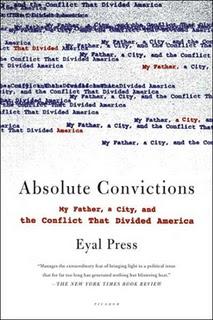Absolute Convictions

If you’ve never heard of Roe v. Wade, you’ve either been living in Papua, New Guinea for the past four decades or Russian cosmonauts kidnapped you when you were two. The impact this decision continues to have on the cultural and political consciousness of our country could more accurately be described as a stranglehold. As we are seeing, once again, in this new political season, any politician who wants to run for national office has to pass the “litmus” test of Roe v. Wade if he or she is to survive the national gauntlet that is our nation’s political process.
Eyal Press has examined the seemingly impossibly complex subject of legalized abortion from both sides of the political spectrum, and numerous viewpoints in between, and brought the issue into focus with his well-written and painstakingly researched book Absolute Convictions.
What makes this book especially compelling is that Press experienced first-hand the impact Roe v. Wade had on abortion providers and their families in the early 70s. Press - the son of an Israeli obstetrician who immigrated to Buffalo, New York in 1973, the same year the Supreme Court handed down its controversial 7-2 decision legalizing abortion - had the unique perspective of seeing the personal toll this national debate took on abortion providers and their families.
While providing a historical overview of the abortion debate and exploring the myriad of factors that led to the court’s decision in 1973, Press is not afraid to delve deeply into both sides of the issues in his search for the “heart of the matter.”
As he recounts in his book, the only way to get a safe abortion in New York prior to 1970 was to convince two psychiatrists that one’s life would otherwise be at risk. Each had to be paid $75 for the consultation, beyond which there was the procedure itself. A study performed in two Buffalo teaching hospitals found that, between 1943 and 1964, 482 hospital-approved therapeutic abortions were performed on private patients, just 22 on poorer clinic patients. The class division overlapped with a racial one.
He also eloquently describes the opposing point of view through interviews with key figures in the Right-to-Life movement: _To Karen Swallow Prior, the appropriateness of the analogy with the civil rights movement was clear, “Abortion is a civil rights issue to me,” she told me. The rights in question, she explained, belonged to unborn babies whose lives surely took precedence over the feelings of women like the one my father counseled that day. _
Press explores his own ambivalence about his father’s decision to continue carrying out abortions despite having to endure death threats and daily protests and vigils at his clinic. He writes: My father’s decision to stay the course in the face of the most vociferous movement of our time hasn’t always been an easy or pleasant thing for me to watch. But it has taught me things I’m not sure I would otherwise know: about what it means to stand by one’s principles; about the price that courage exacts; about the difference in saying you believe in something and committing your life to it.
No. We work with writers who live all over the globe.
Is Feminist Review specifically a USA blog?